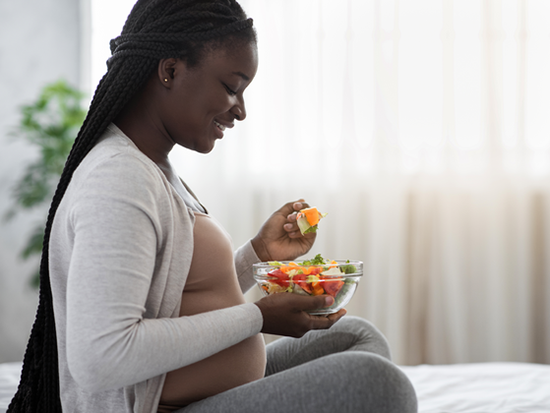Good nutrition involves eating a healthy and balanced diet to ensure the body gets the nutrients it needs to function well. While nutrition is important at all stages of life, experts at the University of Alabama at Birmingham say nutrition during pregnancy is especially important and making healthier food choices every day will help keep both the mother and the baby healthy.
A staggering 70 percent of pregnant women exceed recommended intakes of added sugars, sodium and saturated fats. Additionally, more than half gain excess weight during pregnancy, risking the mother’s and baby’s health.
“This comes with risks associated with poor nutrition such as pre-term birth, gestational diabetes, excess weight gain, hypertensive disorders and potential complications with delivery, among other issues,” said Camille Worthington, Ph.D., assistant professor in the UAB Marnix E. Heersink School of Medicine Division of General Internal Medicine and Population Science.
Research suggests that, when moms engage in healthy nutrition during pregnancy, infants can become accustomed to some of these foods and flavors, which may help them accept and enjoy similar foods as they get older. This is due to flavors from the mother’s diet being transmitted to the amniotic fluid and consumed by the fetus. Following childbirth, these flavors can be transmitted through breast milk as it exposes the baby to foods, spices and beverages the mother consumes.
What to eat
According to the American College of Obstetricians and Gynecologists, women who are pregnant with one fetus should eat an additional 340 calories per day starting in the second trimester. Women who are carrying twins should eat about 600 extra calories a day, and women with triplets should consume an extra 900 calories a day.
By eating healthy foods and taking a prenatal vitamin every day, women can get the vitamins and minerals they need during pregnancy. Pregnant women should focus on eating foods with folic acid, iron, calcium, vitamin D, choline, omega-3 fatty acids, vitamin B and vitamin C.
Some of the foods that can help pregnant women get the vitamins and nutrients they need include:
- Meat such as chicken, beef, liver and pork. Avoid cured meats.
- Eggs
- Seafood such as fatty fish including salmon, sardines and anchovies. Avoid seafood with high mercury levels. This chart by the U.S. Food and Drug Administration explains which fish to eat and the amount of fish that is safe to eat.
- Beans and lentils
- Fruits and vegetables
- Enriched breads and cereals
- Milk and dairy
